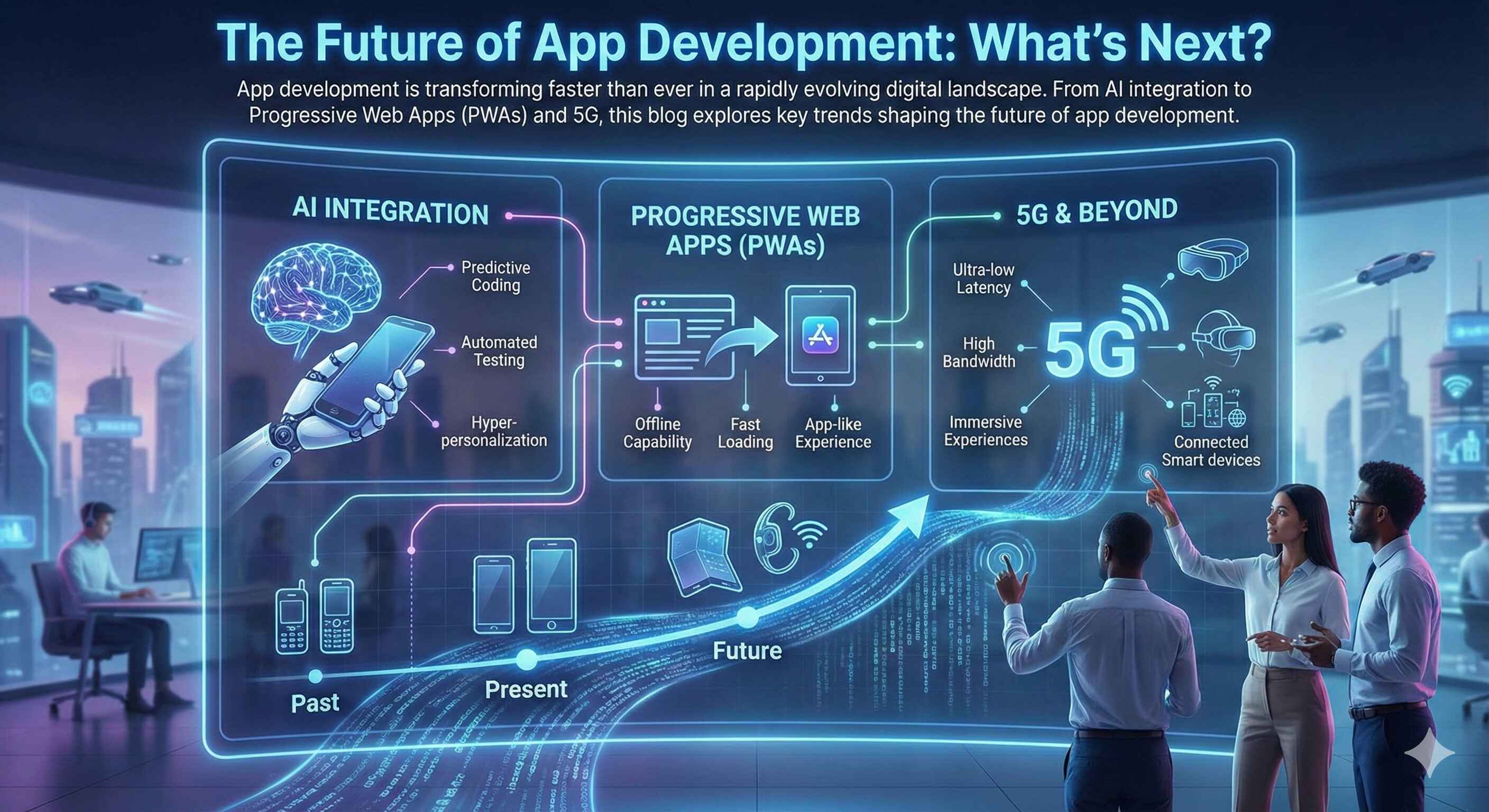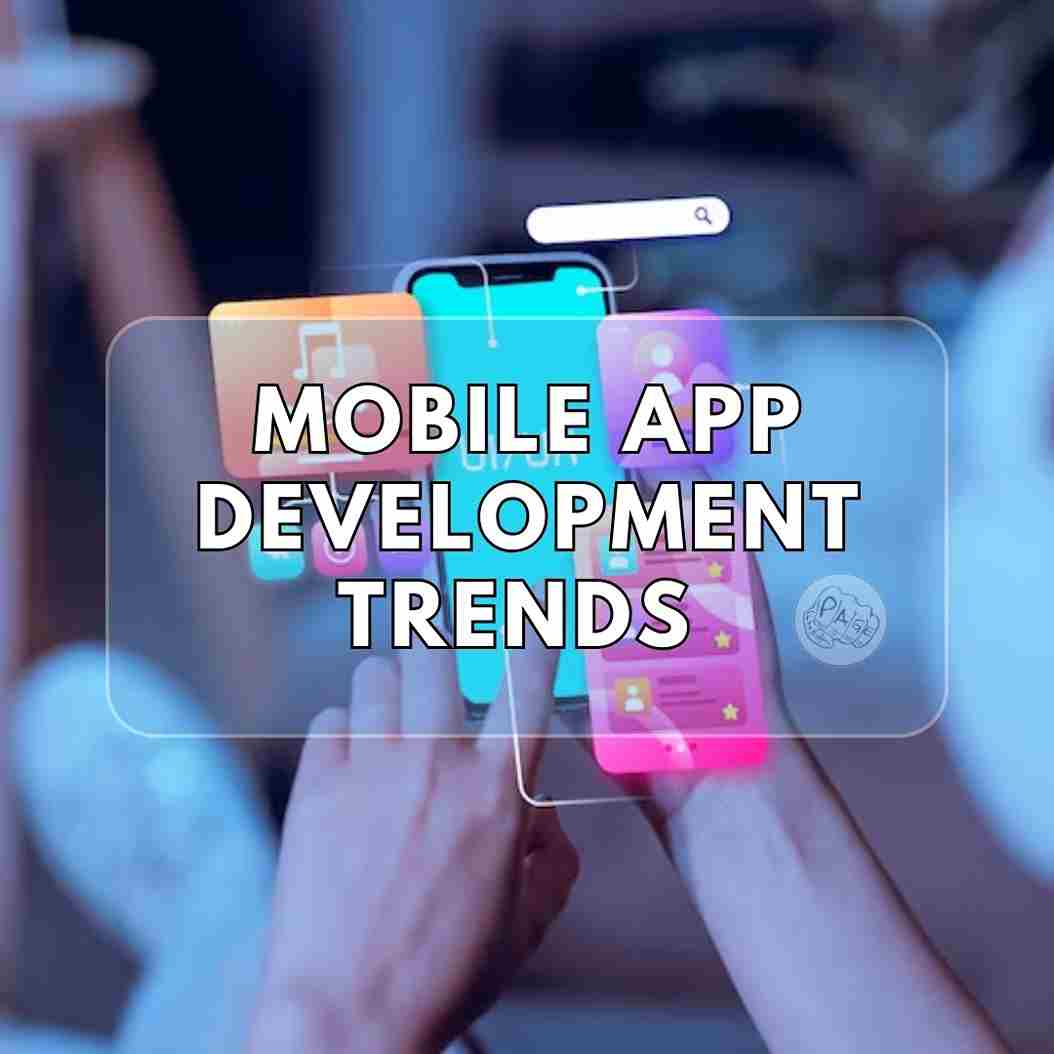The Future of App Development: What’s Next?
App development is transforming faster than ever in a rapidly evolving digital landscape. From AI integration to Progressive Web Apps (PWAs) and 5G, this blog explores key trends shaping the future of app development.
Introduction: The Ever-Changing World of App Development
The world of app development is in constant motion, driven by innovation and the need to stay ahead of user demands. The rise of advanced technologies like Artificial Intelligence (AI), 5G networks, and Progressive Web Apps (PWAs) is shaping the way developers create, deploy, and manage mobile applications.
In this blog, we will dive into some of the most critical trends that will dominate the future of app development and why businesses must prepare to adapt.
1. AI Integration: Revolutionizing User Experience
Artificial Intelligence (AI) is no longer a futuristic concept but a present-day reality. AI's integration into apps is reshaping how users interact with technology, making applications smarter, more personalized, and highly efficient. From chatbots to AI-powered voice assistants, AI can anticipate user needs, automate repetitive tasks, and enhance decision-making processes.
How AI is Changing App Development:
- Personalization: AI analyzes user data to provide personalized app experiences, tailoring content and functionality to individual preferences.
- Automation: AI-powered apps can automate routine tasks, making processes faster and reducing human errors.
- Advanced Analytics: AI enhances predictive analytics, allowing businesses to forecast trends and better understand user behavior.
In the future, AI will continue to play a pivotal role in app development, enhancing the user experience and driving business innovation.
2. The Rise of Progressive Web Apps (PWAs)
Progressive Web Apps (PWAs) are becoming a game-changer in the mobile app industry. Blurring the lines between traditional web apps and mobile apps, PWAs offer a seamless user experience across all devices without the need for downloading or installation from app stores.
Key Benefits of PWAs:
- Cross-Platform Compatibility: PWAs work smoothly across devices, be it smartphones, tablets, or desktops.
- Offline Functionality: PWAs can run offline or on poor internet connections, thanks to service workers that cache important resources.
- Reduced Development Costs: Since PWAs eliminate the need for separate app development (iOS, Android, etc.), businesses save on both time and resources.
As businesses look for cost-effective and user-friendly solutions, PWAs are emerging as the future of mobile app development.
3. 5G Technology: A New Era of Speed and Connectivity
With the global rollout of 5G networks, app development is poised for another leap forward. 5G brings faster download speeds, low latency, and the ability to connect billions of devices seamlessly. These improvements will unlock new possibilities for app functionality and performance.
Impact of 5G on App Development:
- Enhanced Real-Time Features: 5G’s ultra-low latency makes it possible for real-time features such as live streaming, AR/VR experiences, and IoT applications to function smoothly.
- Improved User Experience: With faster data transmission, app users will experience quicker load times, higher-quality media, and smoother connectivity.
- Supports New Technologies: 5G will allow developers to create more sophisticated apps, integrating technologies like augmented reality, virtual reality, and edge computing.
The arrival of 5G is set to drive innovations that were once thought impossible, providing a foundation for more advanced apps and improved user experiences.
Conclusion: Adapting to the Future of App Development
The future of app development is filled with exciting opportunities as AI integration, PWAs, and 5G are set to dominate the landscape. For businesses and developers, embracing these trends is essential to remain competitive in a tech-driven world.
As these technologies continue to evolve, developers need to stay informed and adopt a forward-thinking approach to deliver cutting-edge apps that offer both functionality and user satisfaction.
If you're looking to stay ahead in the app development game, start exploring these trends today!
Share This Post
Related Articles
App Development for Beginners
If you are interested in app development but have no prior experience, this guide will help you get started. App development is the process of creating software applications that run on various devices, such as smartphones, tablets, computers, or smartwatches. There are many tools and platforms that you can use to create apps, depending on your goals, preferences, and skills.
What is Flutter Framework?
Flutter is a cross-platform framework that allows developers to create applications for different operating systems, such as Android, iOS, Windows, Linux, and Mac. Flutter uses a single codebase and a declarative UI approach to simplify the development process and improve the performance and quality of the applications. Flutter also supports hot reload and hot restart features, which enable faster iterations and debugging.
App Development: A Guide for Beginners
If you are interested in creating your own mobile or web applications, this guide will help you get started. App development is a rewarding and challenging field that requires creativity, technical skills, and a passion for solving problems. In this guide, you will learn the basics of app development.
Android Studio Tutorial for Beginners
If you are new to Android development and want to learn how to create your own apps, this tutorial is for you. In this tutorial, you will learn how to use Android Studio, the official integrated development environment (IDE) for Android, to create a simple app that displays a message on the screen. You will also learn some basic concepts and skills of Android development, such as creating layouts, adding widgets, running and debugging your app, and more.
Mobile App Development Trends to Watch in 2023
Discover the top Mobile App Development Trends to Watch in 2023! From AI-powered apps to the metaverse and blockchain integration, stay ahead in the world of mobile app development.
Related FAQ
No related FAQ.
Say Hello
To Your Dream





